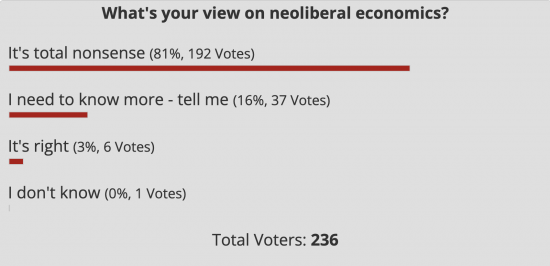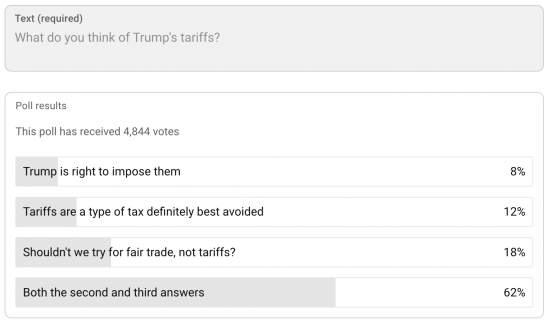I hope that people do not mind these posts where I compare the results for the previous day's polls, because I put those polls up because I am genuinely interested in what people think, and presume that others might be as well.
This was the result of yesterday‘s poll on neoliberalism from this blog:

This was the result of the similar poll on YouTube, where, as usual, the number of votes was much larger:

There was strong overnight polling on that one, which lifted the pro-Trump vote from 3% to 8%. It looks like the US right-wing noticed what was happening.
What is clear from both polls is three things.
Firstly, the number of people who believe in neoliberalism who are also watching my channel or reading here can be considered few and far between.
Secondly, there appears to be a broadly based consensus that neoliberal economics is complete rubbish.
Thirdly, I think I can conclude that the series that I am proposing to write will have some use.
Now, I just need to write it, and that is part of this week's work, alongside another nine videos that we already have sketched out for a production. We could be busy, but I am not complaining. I am really enjoying producing this sort of material.
Thanks for reading this post.
You can share this post on social media of your choice by clicking these icons:
There are links to this blog's glossary in the above post that explain technical terms used in it. Follow them for more explanations.
You can subscribe to this blog's daily email here.
And if you would like to support this blog you can, here:


 Buy me a coffee!
Buy me a coffee!

Saying that is a good start to any week these days.
With regard to qu3 of YouTube poll on fair trade, if we want fairer international trade, shouldn’t we be looking at Keynes plans for an International Clearing Union as a starting point? An economics based explicitly focussed on human needs rather that market wants
The overriding problem of neoliberal economics both domestically and internationally is rising inequality, if we are to tackle either we need an economics based on people that is economic based on morals, not what we have which is economics based on abstract concepts of the market, that is economics that is amoral
We need an economics of the people and for the people.
I have long thought that idea needs revisiting.
“An economics based explicitly focussed on human needs”.
Basic “human needs” are relatively easy to identify & for the most part can be provided by the state (health, education, public transport, energy, water, sewage – probably couple of others = “public goods”). Industry (private) can meet the equipment needs for the provision of the public goods & that implies a role for markets. Once these basic needs are met – what role for industry (private?) and markets? Given fast fashion, SUVs, other nonesense, it would seem that regulation above & beyond what happens now is needed. Is this where “morality” & sensible use of resources intersect? The role of international trade (sustaining slavery or helping people out of poverty?).
Is this what you mean by: “We need an economics of the people and for the people.”
Agreed
“neoliberal economics”, we all have perfect information, the rational man, perpetual motion machines, the exlir of life, unicorns, flying pigs.
The second & third phrases are the bedrock of neo-lib economics. They are fantasies like the others on the list.
Neo-lib economics is not even worthy of the name – & it’s not even “rubbish” (some rubbish has value) – it has the same connection to reality as 3,4,5,6 – above.
Those that justify neo-lib economics are: con-men, liars, fantasists, imbeciles, morons, deluded, mad, …. (tick all that are applicable).
Do I support neoliberalism? No, too many downsides for me.
However since the 1980s that has been the overriding philosophy guiding govt policymaking, markets, international trade etc.
To coin a phrase butchers, bakers, candlestick makers have thrived. Many of us have worked, grown our income, acquired a house, earned a pension etc.
For many it delivers. The actual numbers are worth debating I know but under the post WW2 social and economic settlement was it better or worse?
I grew up in the 70s and our household was one that suffered periods of strike action. We had little money and lived from week to week. Society might have been more equal then, UK might have been a more capable state then, especially with Education but many working class people lived week to week.
What’s my point? The overriding philosophy prior to neoliberalism wasn’t much better for ordinary people despite working classes having more leverage.
Advocating the destruction of neoliberalism might feel right but will it change things for ordinary people?
To be frank I am not so convinced. Given our global challenges matters might be worse whether neoliberalism has fallen out of use as the guiding philosophy or not.
The post WW2 consensus was better, for everyone but the very rich. Full stop.
And I have to disagree with you re life pre-Thatcher for the working classes. I suggest you are very wrong – and so does the data.
The data suggests that post WW2 up to 1979 the working classes had a better time than now?
My comment was working classes lived from week to week while granted not very scientific phrase.
What data are you thinking of?
I’m intrigued.
Please just point me to a source I know you are busy this week.
Just like at data in earnings growth and earnings distribution and it is clear. There is masses on this.
If you have music on in the background whilst doing the prep, you might want to listen to Martin Simpson’s songs “Neo” and “More than enough” from his 2019 album ‘Rooted’. Apologies if folk/roots music ‘ain’t your thang’ but he really is one hell of a musician and the lyrics on these two tracks is so appropriate.
Thanks
I admit I rarely listen to music whilst working
I then overload the system – which is usually working on two things at once already
Neoliberalism has become a kind of religion in a way, as many political and other ideologies do. Thatcher the wild eyed prophet stepped out of the wilderness and preached to the …
I’m being silly there. But the general point I’m making is true. Reading the ‘reasons’ and excuses for the Irish Famine and no doubt the 3 major famines in India during C19 that it was and they were God’s will was used to excuse these things. I wouldn’t be in any way surprised if there were people in the British establishment today who felt exactly the same about what’s happening now in terms of economic divisions, the persecution of the poor & disabled, the increasingly brutal face of the state towards the citizenry and the basic fact that society in the UK is becoming and has become hard, harsh, uncaring and a lot of us are despairing and without hope of any kind. So, to cut it short, the rise of many evils can be bizarrely justified by some kind of spurious religious belief. It’s nothing new, in my educated opinion. We see it particularly in the US today, Christian nationalism, but we have undercurrents of it here and we certainly did in the C19.
It explains why and how evil people can use a religious impetus for altogether horrendous things, and as with neoliberalism itself, these things need mentioning and pointing out from time to time.
Talking of Neoliberalism The Guardian needs to be put out to pasture when it’s come down to publishing the following meandering and uninformative crap:-
https://www.theguardian.com/commentisfree/2025/aug/08/labour-austerity-elections-spending-cuts
The first para condemns it.
More on the government is like a household a favourite Neoliberal stick to beat the MMTer’s with:-
“The household metaphor is not descriptive; it is prescriptive. It does not describe how the state is, but how it should be. It imports into public debate a whole set of moral values associated with domestic management: prudence, responsibility, foresight, and saving. Conversely, a public deficit is immediately equated with recklessness, extravagance, or even a form of immorality (« living off others »).”
https://mmt-france.org/2025/08/07/the-economy-of-narratives/
So if the government is meant to operate like a household how does it deal with problems that affect the nation as a whole, like a sub-optimal economy, financial crashes, pandemics, wars, etc.? The Household Cudgelists are at a loss to explain!
Agreed
David Byrne says:
Slightly off-theme, but straight out of the neoliberal greed book. It certainly needs to be put on the watch-list.
“Rolls Royce offloads Uk Pension Fund in £4.3bn deal with PIC (Pension Insurance Corporation)”. “This to simplify the balance sheet” insisted the RR CFO with pride.
Coincidentally, Athora is looking to take over PIC with backing from Apollo, the Private Equity (PE) investment management company.
Plenty of cash there to be plundered maybe!
It is one to watch.
Are other UK Pension Funds to be targeted?
These games of financial engineering with pensioners’ futures are very popular with CEOs of large companies and with corporate financiers who see the opportunity to arbitrage gains at cost to the well-being of ordinary people who are dependent upon the income that these pensions do and will provide.